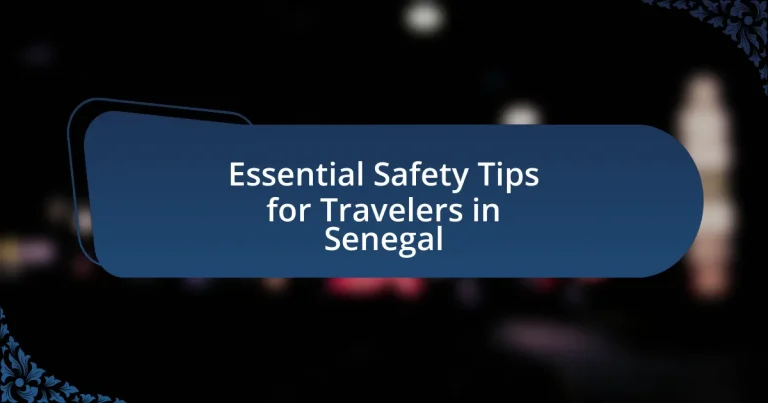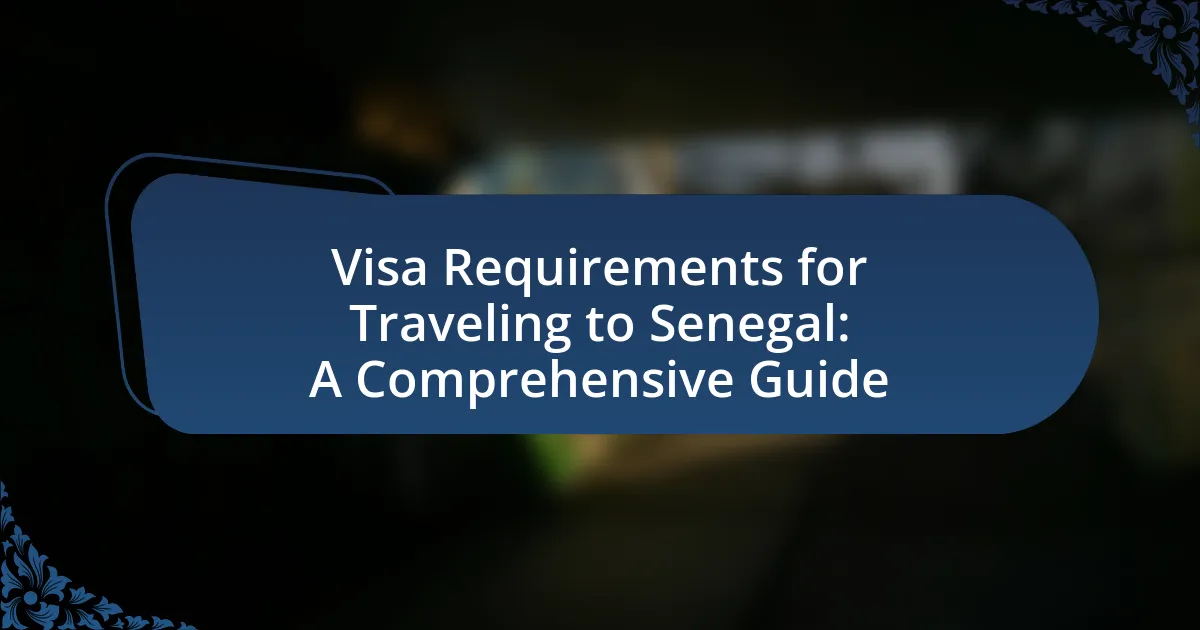The article focuses on essential safety tips for travelers in Senegal, emphasizing the importance of personal safety and cultural sensitivity. Key topics include awareness of surroundings, avoiding isolated areas, securing valuables, and respecting local customs, particularly in rural regions. It addresses specific risks such as petty crime, health concerns, and road safety issues, while providing practical advice on transportation options and emergency procedures. Additionally, the article highlights the significance of understanding local customs and language to enhance safety and foster positive interactions with locals.
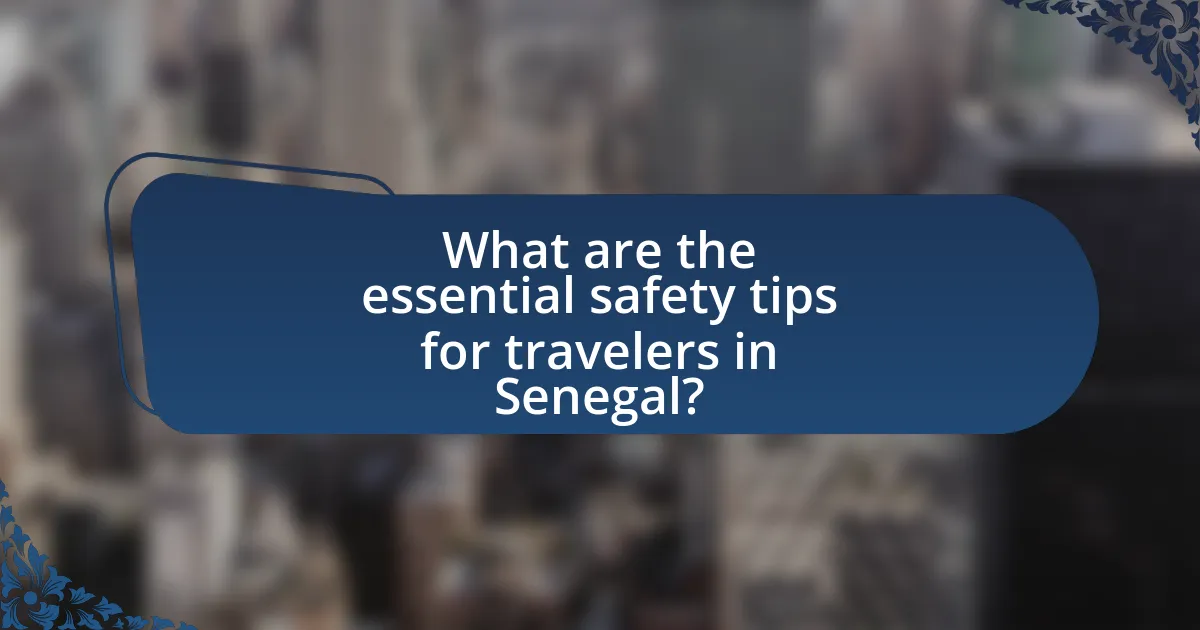
What are the essential safety tips for travelers in Senegal?
Travelers in Senegal should prioritize personal safety by staying aware of their surroundings, avoiding isolated areas, and using reputable transportation services. It is advisable to keep valuables secure and out of sight to deter theft. Additionally, travelers should respect local customs and dress modestly, particularly in rural areas, to foster positive interactions with locals. Staying informed about local laws and regulations is crucial, as is registering with one’s embassy upon arrival for added security. These practices are supported by travel advisories from government agencies, which emphasize the importance of vigilance and cultural sensitivity in ensuring a safe travel experience.
Why is safety a concern for travelers in Senegal?
Safety is a concern for travelers in Senegal due to issues such as petty crime, political instability, and health risks. Petty crime, including pickpocketing and theft, is prevalent in urban areas, particularly in Dakar, where tourists may be targeted. Additionally, political demonstrations can occur, leading to potential unrest, especially during election periods. Health risks, including malaria and limited access to quality healthcare, further contribute to safety concerns for visitors. According to the U.S. Department of State, travelers are advised to remain vigilant and take precautions to ensure their safety while visiting Senegal.
What specific risks should travelers be aware of in Senegal?
Travelers in Senegal should be aware of risks such as petty crime, health concerns, and road safety issues. Petty crime, including pickpocketing and bag snatching, is prevalent in urban areas like Dakar, particularly in crowded markets and tourist spots. Health risks include diseases such as malaria and yellow fever, necessitating vaccinations and preventive medications. Additionally, road safety is a concern due to poorly maintained roads and reckless driving behavior, which can lead to accidents. According to the U.S. Department of State, travelers are advised to remain vigilant and take precautions to mitigate these risks.
How does the local environment impact traveler safety?
The local environment significantly impacts traveler safety by influencing factors such as crime rates, health risks, and natural hazards. In Senegal, for instance, urban areas like Dakar may present higher crime rates, necessitating travelers to remain vigilant and avoid certain neighborhoods, especially at night. Additionally, the presence of tropical diseases, such as malaria, highlights the importance of preventive measures like vaccinations and mosquito repellent. Furthermore, the local climate can lead to natural hazards, such as flooding during the rainy season, which can disrupt travel plans and pose safety risks. These environmental factors collectively shape the safety landscape for travelers in Senegal.
What general safety precautions should travelers take in Senegal?
Travelers in Senegal should take several general safety precautions to ensure their well-being. First, it is advisable to stay informed about local laws and customs, as understanding cultural norms can prevent misunderstandings and conflicts. Additionally, travelers should avoid displaying valuable items, such as expensive jewelry or electronics, to reduce the risk of theft. It is also recommended to use reputable transportation services and avoid walking alone at night in unfamiliar areas, as this can enhance personal safety. Furthermore, travelers should keep emergency contact numbers handy, including local authorities and their country’s embassy, to address any urgent situations effectively. These precautions are essential for a safe travel experience in Senegal.
How can travelers protect their belongings while in Senegal?
Travelers can protect their belongings while in Senegal by using secure bags, staying vigilant in crowded areas, and avoiding displaying valuables. Secure bags, such as those with zippers and anti-theft features, help deter pickpockets. Staying vigilant in crowded markets or public transport reduces the risk of theft, as these areas are often targeted by thieves. Additionally, avoiding the display of expensive items, such as jewelry or electronics, minimizes the likelihood of attracting unwanted attention. These strategies are supported by travel safety guidelines that emphasize awareness and proactive measures to safeguard personal belongings.
What health precautions should travelers consider before visiting Senegal?
Travelers should consider several health precautions before visiting Senegal, including vaccinations, malaria prevention, and safe food and water practices. The Centers for Disease Control and Prevention (CDC) recommends vaccinations for hepatitis A, hepatitis B, typhoid, and yellow fever, as these diseases are prevalent in the region. Additionally, malaria is a significant risk in Senegal, particularly in rural areas, so travelers should take antimalarial medication and use insect repellent to reduce exposure to mosquito bites. It is also crucial to drink bottled or boiled water and eat well-cooked food to avoid foodborne illnesses, as sanitation standards may vary.
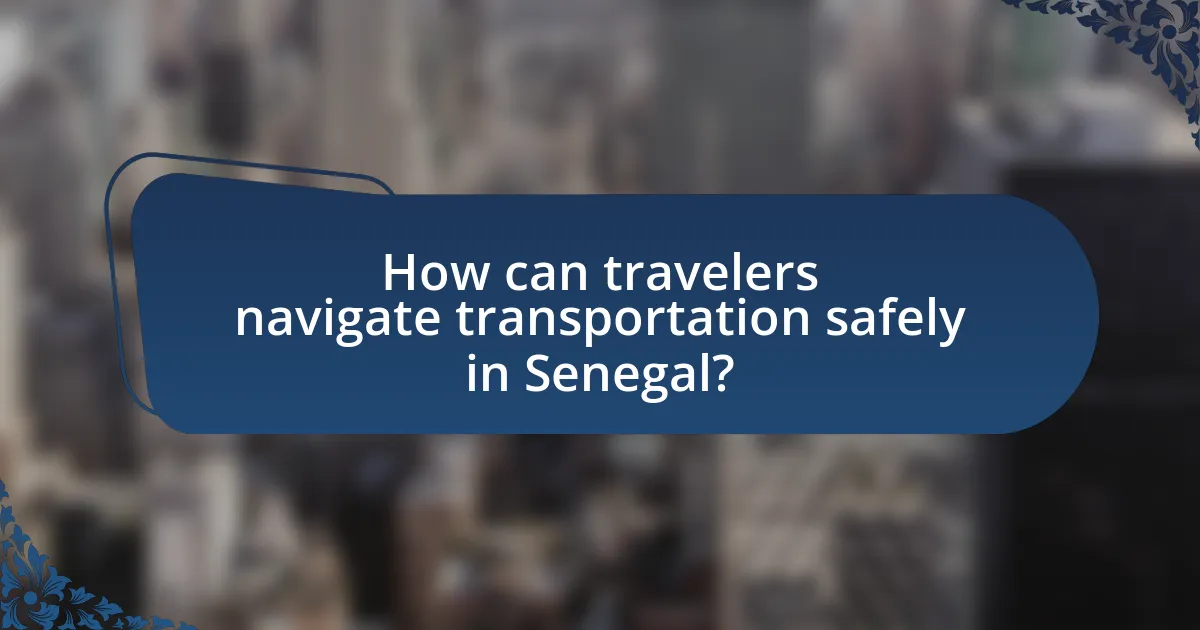
How can travelers navigate transportation safely in Senegal?
Travelers can navigate transportation safely in Senegal by using reputable taxi services, avoiding public transport during peak hours, and staying aware of their surroundings. Reputable taxi services, such as those booked through hotel concierges or established apps, reduce the risk of scams and ensure reliable transportation. Public transport, including “sept-place” shared taxis, can be overcrowded and less secure, especially during busy times. Additionally, travelers should remain vigilant about their belongings and avoid displaying valuables to minimize the risk of theft.
What are the safest modes of transportation in Senegal?
The safest modes of transportation in Senegal are private taxis and organized tour services. Private taxis offer a more controlled environment, reducing risks associated with public transport, while organized tour services provide professional drivers familiar with local conditions. According to the U.S. Department of State, using reputable transportation services minimizes exposure to potential safety hazards, making these options preferable for travelers.
How do public transport options compare in terms of safety?
Public transport options in Senegal, including buses, taxis, and car rentals, vary in safety levels. Buses are generally considered less safe due to overcrowding and poor maintenance, leading to a higher risk of accidents. Taxis, while more comfortable, can also pose safety concerns due to reckless driving and lack of regulation. Car rentals offer more control over safety but require familiarity with local driving conditions, which can be hazardous. According to the World Health Organization, road traffic injuries are a significant concern in Senegal, highlighting the importance of caution when using any form of public transport.
What should travelers know about driving in Senegal?
Travelers should know that driving in Senegal requires caution due to varying road conditions and local driving habits. The roads can be poorly maintained, especially in rural areas, and drivers often face challenges such as potholes and unmarked hazards. Additionally, Senegalese drivers may not always adhere to traffic rules, making defensive driving essential. It is also important to be aware that many vehicles lack proper safety features, and public transport options can be overcrowded. According to the World Health Organization, road traffic injuries are a significant concern in the country, highlighting the need for vigilance while driving.
What are the best practices for staying safe in urban areas of Senegal?
To stay safe in urban areas of Senegal, travelers should remain vigilant, avoid displaying valuables, and use reputable transportation options. Being aware of surroundings helps in identifying potential risks, while concealing items like jewelry and electronics reduces the likelihood of theft. Utilizing trusted taxi services or ride-hailing apps ensures safer travel, as these options are generally more reliable than informal transport. Additionally, staying informed about local customs and areas to avoid can further enhance personal safety.
How can travelers avoid common scams in Senegal’s cities?
Travelers can avoid common scams in Senegal’s cities by staying vigilant and informed about typical scam tactics. Being aware of common scams, such as overcharging for services, fake guides, and pickpocketing, allows travelers to recognize and avoid them. For instance, travelers should always agree on prices before accepting services like taxi rides or guided tours, as this prevents unexpected charges. Additionally, using reputable transportation services and avoiding isolated areas can reduce the risk of encountering scams. According to the U.S. Department of State, travelers are advised to remain cautious and trust their instincts when something feels off, which is a practical approach to ensuring personal safety and avoiding scams.
What areas should travelers avoid for safety reasons?
Travelers in Senegal should avoid the Casamance region, particularly the areas near the border with Guinea-Bissau, due to ongoing conflicts and security concerns. The Casamance has experienced violence related to separatist movements, which can pose risks to safety. Additionally, urban areas like certain neighborhoods in Dakar, such as the Medina and parts of the Plateau, should be approached with caution due to higher crime rates, including theft and assaults. These recommendations are supported by travel advisories from government agencies, which highlight the importance of staying informed about local conditions and potential risks.
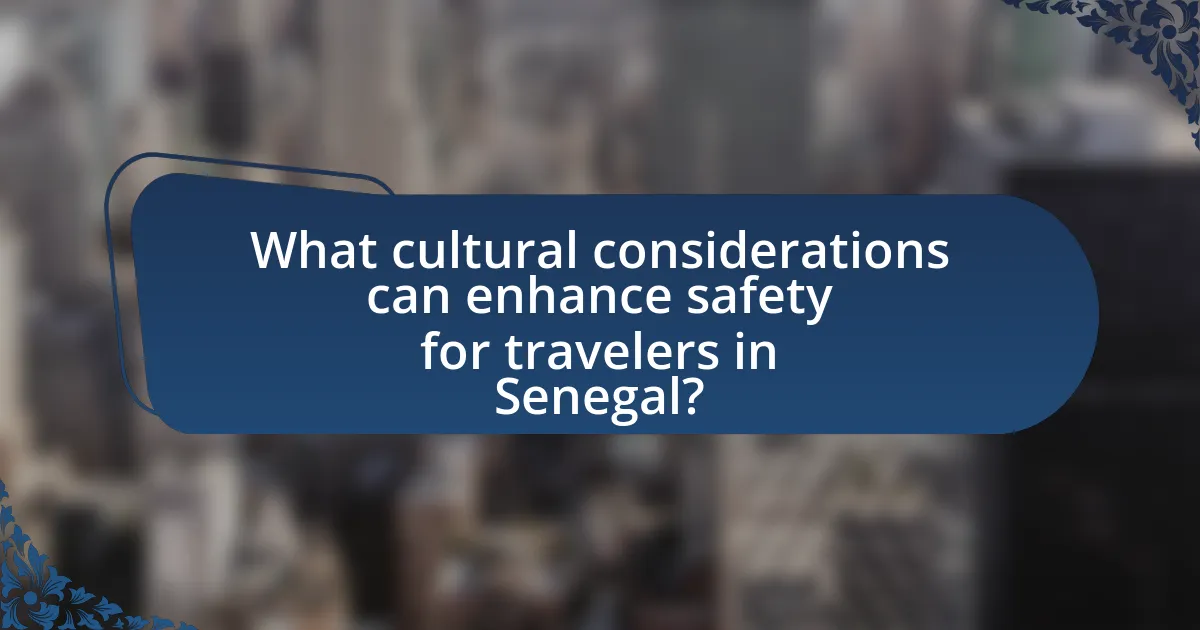
What cultural considerations can enhance safety for travelers in Senegal?
Cultural considerations that can enhance safety for travelers in Senegal include respecting local customs, understanding social hierarchies, and practicing appropriate dress codes. Senegalese culture places a high value on politeness and greetings; travelers should greet locals with a handshake or a nod, which fosters goodwill and reduces misunderstandings. Additionally, being aware of the importance of family and community in Senegalese society can help travelers navigate social interactions more effectively. For instance, addressing individuals by their titles or showing respect to elders can create a positive rapport. Furthermore, dressing modestly, especially in rural areas, aligns with local norms and demonstrates respect for cultural values, thereby minimizing unwanted attention. These cultural practices not only enhance personal safety but also enrich the travel experience by promoting mutual respect and understanding.
How can understanding local customs improve traveler safety?
Understanding local customs can significantly improve traveler safety by fostering respect and reducing misunderstandings. When travelers are aware of cultural norms, such as dress codes, greetings, and social etiquette, they are less likely to inadvertently offend locals, which can lead to hostile situations. For instance, in Senegal, it is customary to greet individuals before engaging in conversation; failing to do so may be perceived as rude. Additionally, understanding local customs helps travelers navigate social dynamics, such as gender roles and communal practices, which can vary widely. This knowledge can prevent situations that might escalate into conflict, thereby enhancing overall safety.
What are the key cultural norms travelers should respect in Senegal?
Travelers in Senegal should respect the cultural norms of greeting, dress code, and social etiquette. Greeting is essential; it is customary to greet everyone with “Salam Aleikum” and engage in small talk before any business or conversation. Dress modestly, especially in rural areas, as Senegalese culture values modesty and conservative attire. Additionally, travelers should be aware of social etiquette, such as using the right hand for giving and receiving items, as the left hand is considered unclean. Respecting these norms fosters positive interactions and demonstrates cultural sensitivity.
How does language play a role in ensuring safety while traveling?
Language is crucial for ensuring safety while traveling as it facilitates clear communication between travelers and locals, enabling the exchange of vital information. Effective communication helps travelers understand local customs, navigate unfamiliar environments, and seek assistance in emergencies. For instance, a study by the World Tourism Organization highlights that travelers who speak the local language are more likely to receive accurate directions and safety advice, reducing the risk of misunderstandings that could lead to dangerous situations. Additionally, language proficiency allows travelers to comprehend safety signs and warnings, further enhancing their ability to avoid hazards.
What should travelers do in case of an emergency in Senegal?
Travelers in Senegal should immediately contact local emergency services by dialing 15 for police, 18 for fire, or 800 00 20 20 for medical emergencies. These numbers connect travelers to the appropriate authorities who can provide assistance. Additionally, travelers should inform their embassy or consulate about the situation, as they can offer support and guidance. It is also advisable to have a list of emergency contacts and important documents readily accessible to facilitate communication and assistance during an emergency.
What emergency numbers should travelers be aware of in Senegal?
Travelers in Senegal should be aware of the following emergency numbers: 17 for police assistance, 18 for fire emergencies, and 15 for medical emergencies. These numbers are crucial for ensuring safety and prompt response in urgent situations. The Senegalese government has established these numbers to facilitate quick access to emergency services, reflecting the country’s commitment to traveler safety.
How can travelers access medical assistance if needed?
Travelers can access medical assistance in Senegal by locating nearby hospitals or clinics, which are available in major cities and tourist areas. In case of an emergency, travelers should dial the local emergency number, which is 15 for ambulances, to receive immediate medical help. Additionally, many hotels and resorts have arrangements with local medical facilities and can assist in contacting them. It is advisable for travelers to have travel insurance that covers medical emergencies, ensuring they can receive necessary care without financial burden.
What are the top safety tips for travelers visiting Senegal?
Travelers visiting Senegal should prioritize personal safety by staying aware of their surroundings, avoiding isolated areas, and securing their belongings. It is advisable to use reputable transportation services and to be cautious when using ATMs, preferably during daylight hours. Additionally, travelers should respect local customs and dress modestly to avoid unwanted attention. According to the U.S. Department of State, petty crime, such as pickpocketing, is common in urban areas, reinforcing the need for vigilance. Staying informed about local laws and customs can further enhance safety during the visit.
